Moudle12 Save our world词汇短语句型精讲 课件(共53张PPT)
文档属性
| 名称 | Moudle12 Save our world词汇短语句型精讲 课件(共53张PPT) |
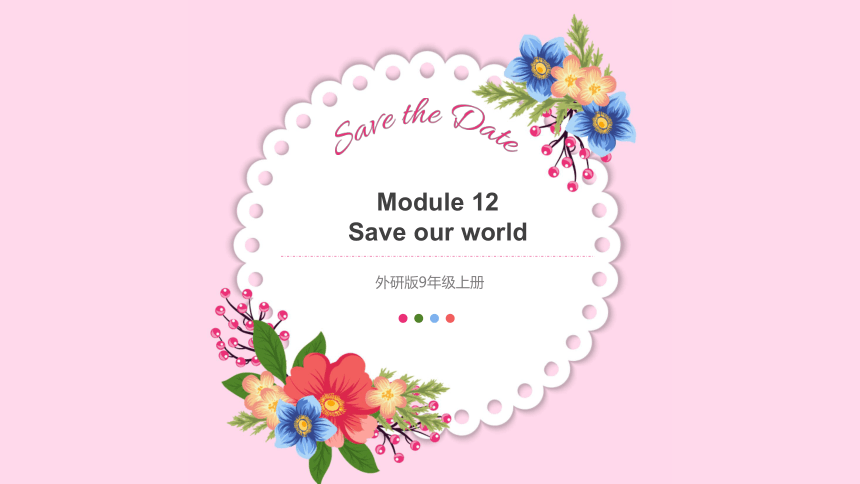
|
|
| 格式 | pptx | ||
| 文件大小 | 13.3MB | ||
| 资源类型 | 教案 | ||
| 版本资源 | 外研版 | ||
| 科目 | 英语 | ||
| 更新时间 | 2021-07-21 00:00:00 | ||
图片预览

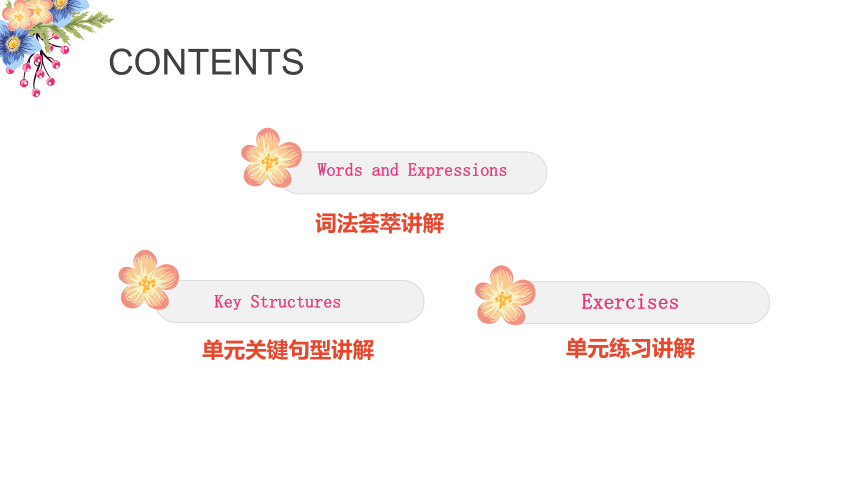
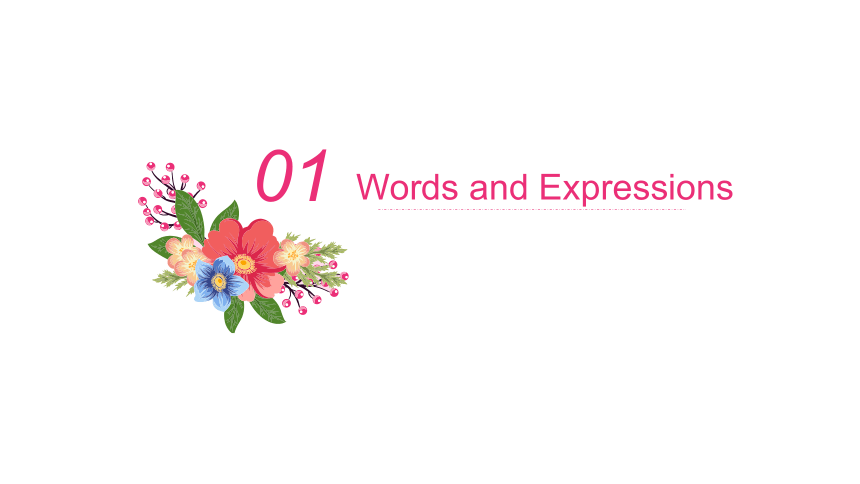
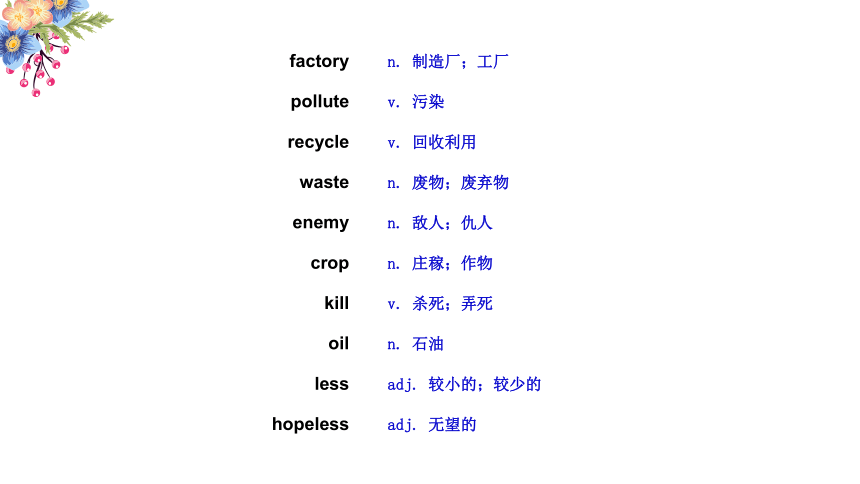
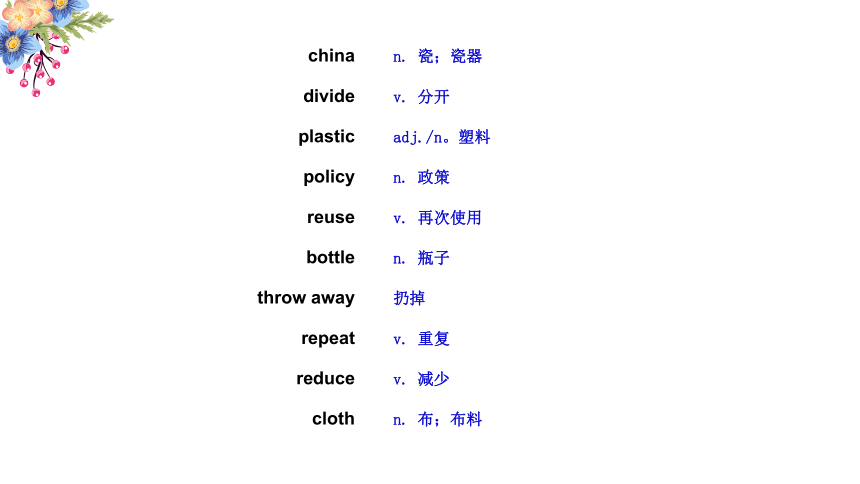
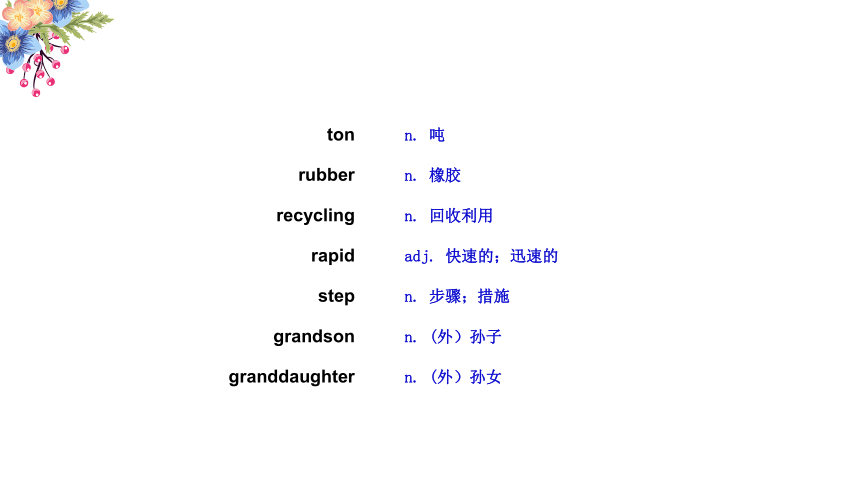
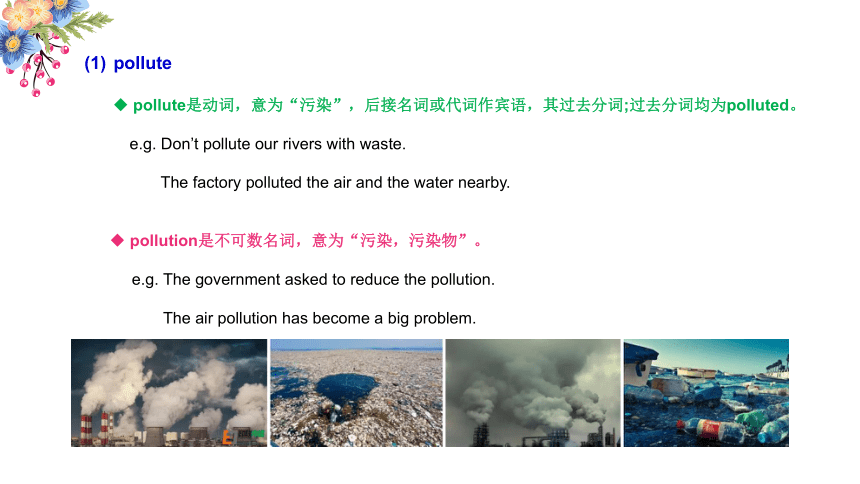
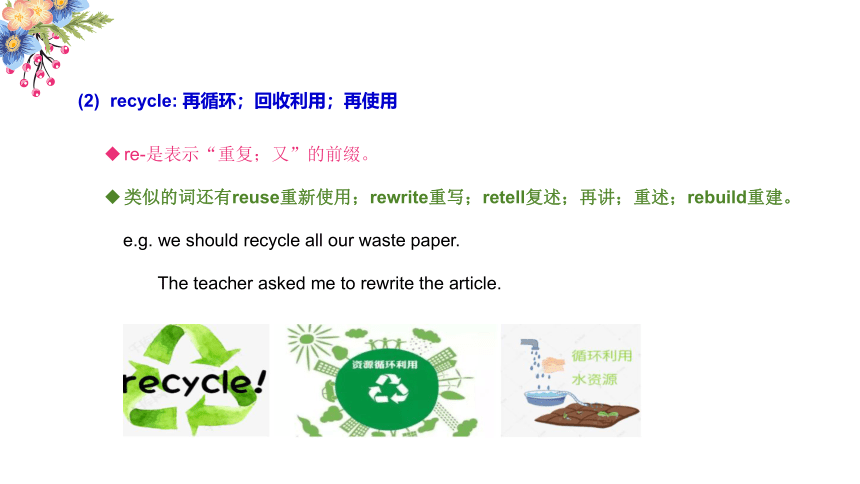
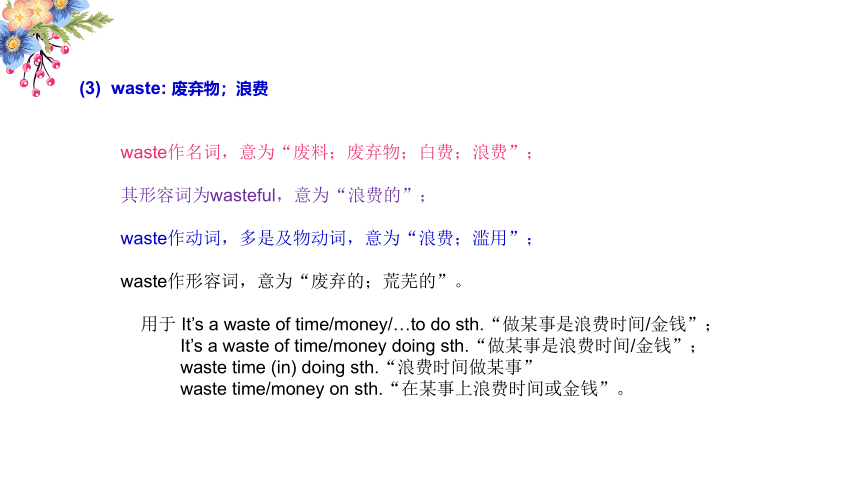
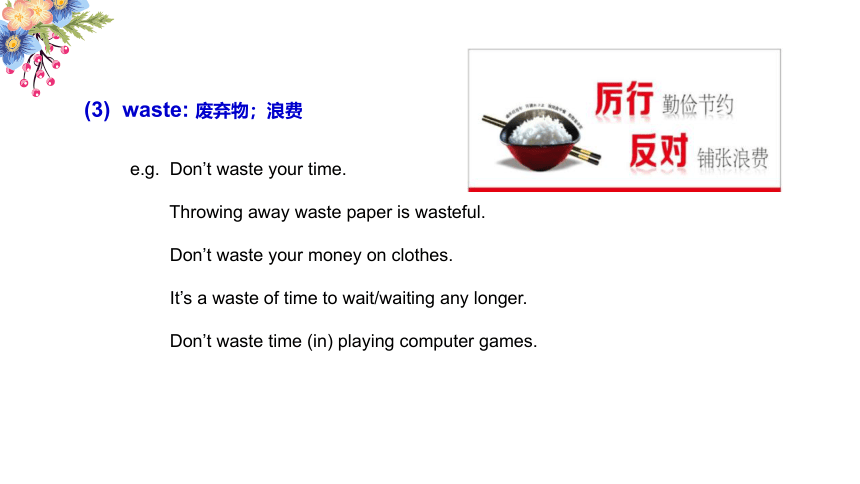
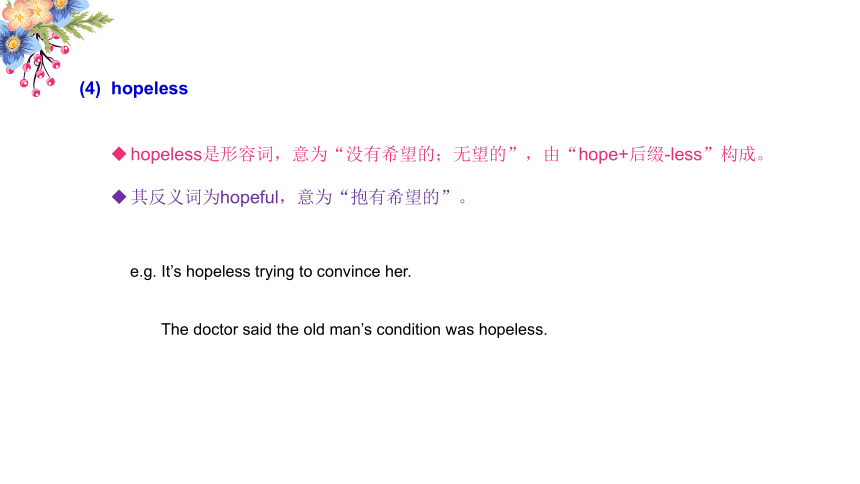
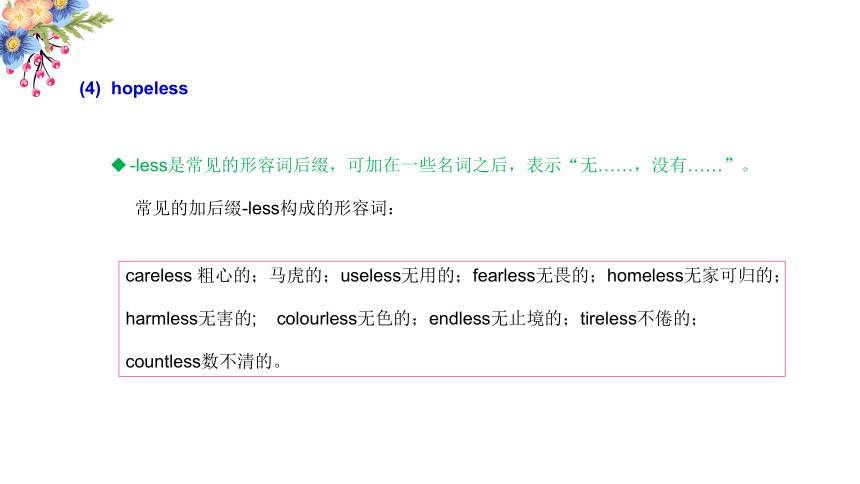
文档简介
Module 12
Save our world
外研版9年级上册
词法荟萃讲解
Words and Expressions
单元关键句型讲解
Key Structures
CONTENTS
Exercises
单元练习讲解
01
Words and Expressions
factory
pollute
recycle
waste
enemy
crop
kill
oil
less
hopeless
n. 制造厂;工厂
v. 污染
v. 回收利用
n. 废物;废弃物
n. 敌人;仇人
n. 庄稼;作物
v. 杀死;弄死
n. 石油
adj. 较小的;较少的
adj. 无望的
china
divide
plastic
policy
reuse
bottle
throw away
repeat
reduce
cloth
n. 瓷;瓷器
v. 分开
adj./n。塑料
n. 政策
v. 再次使用
n. 瓶子
扔掉
v. 重复
v. 减少
n. 布;布料
ton
rubber
recycling
rapid
step
grandson
granddaughter
n. 吨
n. 橡胶
n. 回收利用
adj. 快速的;迅速的
n. 步骤;措施
n. (外)孙子
n. (外)孙女
pollute
pollute是动词,意为“污染”,后接名词或代词作宾语,其过去分词;过去分词均为polluted。
e.g. Don’t pollute our rivers with waste.
The factory polluted the air and the water nearby.
pollution是不可数名词,意为“污染,污染物”。
e.g. The government asked to reduce the pollution.
The air pollution has become a big problem.
recycle: 再循环;回收利用;再使用
re-是表示“重复;又”的前缀。
类似的词还有reuse重新使用;rewrite重写;retell复述;再讲;重述;rebuild重建。
e.g. we should recycle all our waste paper.
The teacher asked me to rewrite the article.
(3) waste: 废弃物;浪费
waste作名词,意为“废料;废弃物;白费;浪费”;
其形容词为wasteful,意为“浪费的”;
waste作动词,多是及物动词,意为“浪费;滥用”;
waste作形容词,意为“废弃的;荒芜的”。
用于 It’s a waste of time/money/…to do sth.“做某事是浪费时间/金钱”;
It’s a waste of time/money doing sth.“做某事是浪费时间/金钱”;
waste time (in) doing sth.“浪费时间做某事”
waste time/money on sth.“在某事上浪费时间或金钱”。
(3) waste: 废弃物;浪费
e.g. Don’t waste your time.
Throwing away waste paper is wasteful.
Don’t waste your money on clothes.
It’s a waste of time to wait/waiting any longer.
Don’t waste time (in) playing computer games.
(4) hopeless
hopeless是形容词,意为“没有希望的;无望的”,由“hope+后缀-less”构成。
其反义词为hopeful,意为“抱有希望的”。
e.g. It’s hopeless trying to convince her.
The doctor said the old man’s condition was hopeless.
(4) hopeless
-less是常见的形容词后缀,可加在一些名词之后,表示“无……,没有……”。
常见的加后缀-less构成的形容词:
careless 粗心的;马虎的;useless无用的;fearless无畏的;homeless无家可归的;
harmless无害的; colourless无色的;endless无止境的;tireless不倦的;
countless数不清的。
(5) divide
divide是及物动词,意为“分开;分隔”,指把一个整体分成若干部分。
e.g. The book is divided into six sections.
Mr. Wang divided his class into five groups.
(5) divide
【辨析】divide与separate的用法辨析:
① divide指把整体分成若干部分,被分开的对象在一定的条件下具有一定的统一性,常与介 词into或in连用。
e.g. A year is divided into four seasons.
Please divide the apple into four pieces.
② separate常与from连用,表示“把……从……分离”,指把原来连在一起或靠近的各个部分隔开,被分隔开的对象没有统一性。
e.g. In the fog, they got separated from the team.
(6) repeat
repeat是动词,意为“重说;重新做”。repeat不可与again搭配使用。
e.g. I repeated after the teacher word by word.
We repeated the experiment and got the same result.
【拓展】前缀“re-”,意为“再一次,重复”。
常见的词有:reuse重复使用;rebroadcast重播;rebirth再生;rebuild重建;remake重新录制;recount重新计票;regain收回,复得;relive重新体验。
(7) reduce
reduce是动词,意为“减少;减低;缩小”。
其常用搭配如下:reduce?by下降了……;reduce?to下降到…?…。
e.g. The driver?reduced?the driving speed.
The price was reduced by 10 percent.??
I will buy the coat if it is reduced to 20 yuan.??
(8) step
step是名词,意为“步骤;措施”。
take steps意为“采取措施”;
take steps to do sth.意为“采取措施做某事”。
与step有关的常用短语:
step by step一步步地,逐渐地; watch one’s step小心行事,当心。
e.g. We need to take some steps to reduce pollution.
We must take steps to prevent this from happening again.
throw away
tons of
cause a lot of pollution
stop the pollution
waste products
such as
be worried about
use...for...
spread over
扔掉
许多
造成大量的污染
制止污染
废弃物
比如
担心
把……用于……;为……而使用……
传遍
make sb. ill
be a danger to
so many/much
as well
It’s no use doing sth.
talk about
think of
a green school
use...to do...
使得某人生病
对……有危害
如此多的
也
做某事没有用
谈论
想起
绿色学校
用……来做……
in poor areas
nice/good/great idea
save energy
start to do sth.
find out
ride a bike to school
turn off
ask for
do with
divide...into...
贫困地区
好主意
节约能源
开始去做某事
找出;查明;弄清楚
骑自行车上学;
关闭;
请求;要求;
处理
把……分类……;
be harmful to
as...as possible
if possible
It is better to do sth.
change...into...
hope for
take steps
so that
draw up
对……有害
尽可能……
如果可能
最好做某事
把……变成……
希望
采取措施
以便;为了;目的是
起草
clean up
pay attention to
keep (sb./sth.) doing sth.
be off
try one’s best to do sth.
not…any more
switch off
把……打扫干净
注意,重视
使得(某人/某物)一直做某事
离开
尽某人最大努力做某事
不再
关掉
throw away
throw away意为“扔掉;丢弃”。
该短语是“动词+副词”结构的短语,当宾语是代词时,代词要放在短语中间。
与throw连用的常见搭配:
throw about乱丢,乱扔; throw at投向;
throw back扔回;
throw oneself into sth.积极投身入某事中去。
throw away
throw away意为“扔掉;丢弃”。
e.g. The food got bad. I have thrown it away.
When are you going to throw away those old magazines?
tons of
tons of意为“大量,许多的,一大堆(口语)”,后可接可数名词复数或不可数名词,用来形容数量很大。
ton是量词,意为“吨”。
拓展tons of位于数词后,表示具体的吨数,a ton of...意为“一吨……”;two tons of...意为“两吨……”。
e.g. I have?tons of?things to do.?
The movie star received tons of fan’s mails.
We stored up ten tons of coal for the winter.
02
Key structures
It makes people ill, and may even kill them. Pollution is a danger to our health. 污染使人生病,甚至可以让人丧命。污染危及我们的健康。
makes sb./sth.+形容词,意为“使某人/某物处于某种状态”,make是使役动词,该结构为
“动词+宾语+宾补”,除了形容词外,过去分词、动词原形也可以作宾补。
e.g. The good news made him very happy.
He could not make himself understood.
What he said made me laugh for a few minutes.
It makes people ill, and may even kill them. Pollution is a danger to our health. 污染使人生病,甚至可以让人丧命。污染危及我们的健康。
be a danger to sb. / sth.意为“对某人/物有危害;对某人/物是一种威胁;有伤害”,相当于be
dangerous to.
与danger有关的常用搭配:be in danger处于危险中;out of danger脱离危险。
e.g. Smoking is a serious danger to health.
It?is?a?danger?to?your?computer’s?health.=It?is?dangerous?to?your?computer’s?health.?
It’s no use talking about things we can’t do. 谈论我们不能做的事是没有意义的。
It’s no use/no good/useless doing sth. 是固定句式,意为“做某事是没有用的”,其中it是形式主语,真正的主语是后面的动名词短语。
相当于There is no use doing...或It’s useless doing.../to do...或 It’s of no use doing...。
use用作名词时,意为“用途/处”。
e.g. It’s no use/no good/useless crying.
It is?no?use/no good/useless?talking without?doing.
Do you buy new clothes just because they are modern? 你仅仅因为时髦而买新衣服吗?
【辨析】clothes,cloth与clothing的用法辨析:
① clothes意为“衣服”,统指各种衣服,是一个没有单数形式的复数名词,谓语动词是复数,其前
不可加不定冠词,也不可加数词,但可用some, these, those, many, few等词修饰。
e.g. I need to buy some clothes.
She has a lot of clothes in her bedroom.
Do you buy new clothes just because they are modern? 你仅仅因为时髦而买新衣服吗?
【辨析】clothes,cloth与clothing的用法辨析:
②cloth指布,常用作不可数名词,a piece of cloth意为“一块布”,如指有特殊用途的布时则为
可数名词,复数形式为cloths。
e.g. Clean the windows with a soft cloth.
I need three yards of cloth to make a suit.
Do you buy new clothes just because they are modern? 你仅仅因为时髦而买新衣服吗?
【辨析】clothes,cloth与clothing的用法辨析:
③ clothing表示“衣服”的总称,是一个不可数的集合名词。
e.g. They wear very little clothing.
We need warm clothing for the winter.
Do you turn off the lights when you leave the room? 离开房间时你关灯吗?
turn off意为“关掉(水源、煤气、电源等)”,其反义词是turn?on。
该短语是“动词+副词”构成的短语。如果它的宾语是代词要放在“动词+副词”中间,如果它的宾语是名词既可以放在“动词+副词”的中间也可以放在动词和副词的后面。
与turn有关的常用短语:turn up调高(音量) ;turn down调低(音量)。
e.g. Be quick.?Turn off?the gas.
You must turn off the lights when you leave the room.
And what do you do with the bottles whey they are empty? 瓶子空了时你怎样处理它们?
【辨析】do with与deal with的用法辨析:
① do with意为“处理,处置,对付”,do是及物动词,后可接宾语,因此do with要与可作宾语
的疑问代词what连用,构成特殊疑问句。What do you do with…? 意为“你怎样处理……?”。
e.g. What will you do with your old books?
② deal with意为“处理,处置,对付”,因此要与疑问副词how连用,构成特殊疑问句。
e.g. How will you deal with the naughty boy?
What do you do with the matter?=How do you deal with the matter?
We all need a healthy environment, but we produce waste every day, and it is harmful to our environment. 我们都需要一个健康的环境,但我们每天制造废物,这对我们的环境是有害的。
be harmful to= do harm to=be bad for意为“对……有害”。
其反义词为do good to=be good for,意为“对……有好处”。
harmful是形容词,意为“有害的”,其反义词是harmless意为“无害的”。其名词和动词形式都是harm意为“伤害;害处”。
e.g. Fruit juices can be harmful to children’s teeth.
Watching TV too much is harmful to/does harm to your eyes.
Exercise will do good to your health.
Use things for as long as possible. 尽可能长时间地使用东西。
as...as possible意为“尽可能……”。
as...as意为“和……一样”,as...as 之间加形容词或副词的原级;be not so/as...as意为“和……不一样”。
e.g. We have to run as fast as possible.
Please answer my question as soon as possible.
My English is not as good as his.
Recycle means “change things into something else to be reused”. 回收利用意思是“将某件东西变成别的东西再利用”。
change...into...是固定搭配,意为“把……变成……”,强调形式上的转变。
change作动词,意为“改变,变化”。
与change有关的常用短语change...for...意为“用……换……”。
e.g. You cannot change iron into gold.
They are changing desert into farmland.
I’d like to change the books for the photo.
We cannot hope for rapid change, but let’s take these simple steps today so that we will save the world for our grandsons and granddaughters tomorrow.
hope for意为“希望,期盼,盼望”,表示对某物充满希望或者很有信心。与hope有关的短语:hope to do sth.希望做某事。
e.g. We are hoping for good weather.
Everyone hopes for a great future.
rapid是形容词,意为“快速的;迅速的”,比另外两词要稍正式些,通常指突然或急速(且连续不断)的动作。还可指一种有益的高速度(相比之下,fast 和 quick 有时指无益的急速)。
e.g. He made rapid progress in English.
He walked down the street at a rapid pace.
We cannot hope for rapid change, but let’s take these simple steps today so that we will save the world for our grandsons and granddaughters tomorrow.
【辨析】so that和so…that…的用法辨析:
① so that可引导目的状语从句,意为“以便;为了;目的是”,此时so that后面从句中的谓语动词
常和can, could, may, might, should等情态动词连用。
e.g. He get up very early so that he can catch the train.
I finished my homework quickly so that I could go to bed earlier.
We cannot hope for rapid change, but let’s take these simple steps today so that we will save the world for our grandsons and granddaughters tomorrow.
【辨析】so that和so…that…的用法辨析:
【拓展】so that也可引导结果状语从句,意为“因此;所以”,在口语中that可以省略。
e.g. He raised his voice, so that everyone heard him.
He hurried to the station so that he caught the early bus.
② so … that …“如此……以至于……”,引导结果状语从句,so后面接形容词或副词的原级。
e.g. We trained so hard that we won the game.
I’ve had so many falls that I’m black and blue all over.
If we pay attention to pollution now, the future will be hopeful. 如果我们现在注意污染,未来将充满希望。
pay attention to意为“注意,重视”,to在此处是介词,后接名词、代词、动名词或从句作宾语。attention是一个抽象名词,没有复数形式。
e.g. Pay attention to listening, don’t make noise.
The teacher asked his students to pay attention to him.
When you write a composition, you should pay attention to your spelling.
If we pay attention to pollution now, the future will be hopeful. 如果我们现在注意污染,未来将充满希望。
【拓展】常见以介词to结尾后接动名词的词组有:
look forward to盼望,期待;
thanks to多亏了;由于;
prefer...to...喜欢……胜过喜欢……;
be/get/become used to习惯于;
put one’s mind to全神贯注于;
give one’s life to献身于。
I hear you are off to the Caribbean for a holiday! 我听说你们要去加勒比海度假!
be off意为“离开”,常与介词to连用,be off to...意为“动身去……”,相当于“leave for...”。
e.g. I am off to school.
He will be off to Beijing soon.
I don’t throw away things if I don’t want them any more. 如果我不再想要某些东西,我也不会把它们扔掉。
【辨析】not…any more,no more,not…any longer与no longer的用法辨析:
① not…any more意为“不再”,相当于no more,其中not用在系动词、助动词或情态动词之
后,而any more位于句末,表示动作发生的次数、频率不再延续,多与终止性动词连用。
e.g. He still smoked, but he drank no more.
You won’t see him any more.=You will see him no more.
I don’t throw away things if I don’t want them any more. 如果我不再想要某些东西,我也不会把它们扔掉。
【辨析】not…any more,no more,not…any longer与no longer的用法辨析:
② not…any longer意为“不再”,相当于no longer,与live, work, stay, support等表示持续性
动作的动词搭配,强调过去的情况在时间上不再延续。
e.g. I don’t work here any longer. (=I no longer work here.)
The boy didn’t stay here any longer. (=The boy no longer stayed here.)
03
Exercise
1. Please ___________ the lights when you leave the room.
A. turn on B. turn off C. turn up D. turn down
2. Thousands of trees should ________ on the mountain.
A. be planted B. plant C. planting D. planted
3. ---Had we better leave right away?
---It’s better __________for another five minutes.
A. wait B. to wait C. waiting D. to waiting
4. We should plant more trees because trees___________ our environment.
A. is good for B. are good at C. are good for D. does well in
5. --- What can _______ to help reduce the pollution? --- Glass, metal and paper.
A. be recycled B. recycle C. be sent D. send
6. Many students are left alone in the countryside. Let’s try our best_________ them.
A. help B. to help C. helping D. helps
7. There are usually _________ people in the supermarket every weekend.
A.too much B. much too C. many too D. too many
8. These are plastic bags. Don’t __________.
A. throw away it B. throw it away
C. throw away them D. throw them away
9. Please give up smoking. It’s___________to your health.
A. harm B. harms C. harmful D. harmless
10. Do you ________ our country’s future?
A. care for B. care about C. take care D. worry
11. ---The government has succeeded in stopping the factories __________the river.
---Really? Good news!
A. to pollute B. pollute C. from polluting D. to polluting
12. These old textbooks can be _______ by students in lower grade. So don’t throw them away.
A. replied B. repeated C. reused D. reduced
13. His help made a difference to ______ the wildlife in this area.
A. save B. saving C. waste D. wasting
14. It’s no use________ at the boy. He’s deaf.
A. shout B. to shout C. shouting D. shouted
15. Please _________these students ________two groups.
A. divide of B. divide in C. divide into D. divide with
1. Please ___________ the lights when you leave the room.
A. turn on B. turn off C. turn up D. turn down
2. Thousands of trees should ________ on the mountain.
A. be planted B. plant C. planting D. planted
3. ---Had we better leave right away?
---It’s better __________for another five minutes.
A. wait B. to wait C. waiting D. to waiting
4. We should plant more trees because trees___________ our environment.
A. is good for B. are good at C. are good for D. does well in
5. --- What can _______ to help reduce the pollution? --- Glass, metal and paper.
A. be recycled B. recycle C. be sent D. send
B
A
A
C
A
6. Many students are left alone in the countryside. Let’s try our best_________ them.
A. help B. to help C. helping D. helps
7. There are usually _________ people in the supermarket every weekend.
A.too much B. much too C. many too D. too many
8. These are plastic bags. Don’t __________.
A. throw away it B. throw it away
C. throw away them D. throw them away
9. Please give up smoking. It’s___________to your health.
A. harm B. harms C. harmful D. harmless
10. Do you ________ our country’s future?
A. care for B. care about C. take care D. worry
B
D
D
C
B
11. ---The government has succeeded in stopping the factories __________the river.
---Really? Good news!
A. to pollute B. pollute C. from polluting D. to polluting
12. These old textbooks can be _______ by students in lower grade. So don’t throw them away.
A. replied B. repeated C. reused D. reduced
13. His help made a difference to ______ the wildlife in this area.
A. save B. saving C. waste D. wasting
14. It’s no use________ at the boy. He’s deaf.
A. shout B. to shout C. shouting D. shouted
15. Please _________these students ________two groups.
A. divide of B. divide in C. divide into D. divide with
C
C
A
C
C
感谢您的观看
Save our world
外研版9年级上册
词法荟萃讲解
Words and Expressions
单元关键句型讲解
Key Structures
CONTENTS
Exercises
单元练习讲解
01
Words and Expressions
factory
pollute
recycle
waste
enemy
crop
kill
oil
less
hopeless
n. 制造厂;工厂
v. 污染
v. 回收利用
n. 废物;废弃物
n. 敌人;仇人
n. 庄稼;作物
v. 杀死;弄死
n. 石油
adj. 较小的;较少的
adj. 无望的
china
divide
plastic
policy
reuse
bottle
throw away
repeat
reduce
cloth
n. 瓷;瓷器
v. 分开
adj./n。塑料
n. 政策
v. 再次使用
n. 瓶子
扔掉
v. 重复
v. 减少
n. 布;布料
ton
rubber
recycling
rapid
step
grandson
granddaughter
n. 吨
n. 橡胶
n. 回收利用
adj. 快速的;迅速的
n. 步骤;措施
n. (外)孙子
n. (外)孙女
pollute
pollute是动词,意为“污染”,后接名词或代词作宾语,其过去分词;过去分词均为polluted。
e.g. Don’t pollute our rivers with waste.
The factory polluted the air and the water nearby.
pollution是不可数名词,意为“污染,污染物”。
e.g. The government asked to reduce the pollution.
The air pollution has become a big problem.
recycle: 再循环;回收利用;再使用
re-是表示“重复;又”的前缀。
类似的词还有reuse重新使用;rewrite重写;retell复述;再讲;重述;rebuild重建。
e.g. we should recycle all our waste paper.
The teacher asked me to rewrite the article.
(3) waste: 废弃物;浪费
waste作名词,意为“废料;废弃物;白费;浪费”;
其形容词为wasteful,意为“浪费的”;
waste作动词,多是及物动词,意为“浪费;滥用”;
waste作形容词,意为“废弃的;荒芜的”。
用于 It’s a waste of time/money/…to do sth.“做某事是浪费时间/金钱”;
It’s a waste of time/money doing sth.“做某事是浪费时间/金钱”;
waste time (in) doing sth.“浪费时间做某事”
waste time/money on sth.“在某事上浪费时间或金钱”。
(3) waste: 废弃物;浪费
e.g. Don’t waste your time.
Throwing away waste paper is wasteful.
Don’t waste your money on clothes.
It’s a waste of time to wait/waiting any longer.
Don’t waste time (in) playing computer games.
(4) hopeless
hopeless是形容词,意为“没有希望的;无望的”,由“hope+后缀-less”构成。
其反义词为hopeful,意为“抱有希望的”。
e.g. It’s hopeless trying to convince her.
The doctor said the old man’s condition was hopeless.
(4) hopeless
-less是常见的形容词后缀,可加在一些名词之后,表示“无……,没有……”。
常见的加后缀-less构成的形容词:
careless 粗心的;马虎的;useless无用的;fearless无畏的;homeless无家可归的;
harmless无害的; colourless无色的;endless无止境的;tireless不倦的;
countless数不清的。
(5) divide
divide是及物动词,意为“分开;分隔”,指把一个整体分成若干部分。
e.g. The book is divided into six sections.
Mr. Wang divided his class into five groups.
(5) divide
【辨析】divide与separate的用法辨析:
① divide指把整体分成若干部分,被分开的对象在一定的条件下具有一定的统一性,常与介 词into或in连用。
e.g. A year is divided into four seasons.
Please divide the apple into four pieces.
② separate常与from连用,表示“把……从……分离”,指把原来连在一起或靠近的各个部分隔开,被分隔开的对象没有统一性。
e.g. In the fog, they got separated from the team.
(6) repeat
repeat是动词,意为“重说;重新做”。repeat不可与again搭配使用。
e.g. I repeated after the teacher word by word.
We repeated the experiment and got the same result.
【拓展】前缀“re-”,意为“再一次,重复”。
常见的词有:reuse重复使用;rebroadcast重播;rebirth再生;rebuild重建;remake重新录制;recount重新计票;regain收回,复得;relive重新体验。
(7) reduce
reduce是动词,意为“减少;减低;缩小”。
其常用搭配如下:reduce?by下降了……;reduce?to下降到…?…。
e.g. The driver?reduced?the driving speed.
The price was reduced by 10 percent.??
I will buy the coat if it is reduced to 20 yuan.??
(8) step
step是名词,意为“步骤;措施”。
take steps意为“采取措施”;
take steps to do sth.意为“采取措施做某事”。
与step有关的常用短语:
step by step一步步地,逐渐地; watch one’s step小心行事,当心。
e.g. We need to take some steps to reduce pollution.
We must take steps to prevent this from happening again.
throw away
tons of
cause a lot of pollution
stop the pollution
waste products
such as
be worried about
use...for...
spread over
扔掉
许多
造成大量的污染
制止污染
废弃物
比如
担心
把……用于……;为……而使用……
传遍
make sb. ill
be a danger to
so many/much
as well
It’s no use doing sth.
talk about
think of
a green school
use...to do...
使得某人生病
对……有危害
如此多的
也
做某事没有用
谈论
想起
绿色学校
用……来做……
in poor areas
nice/good/great idea
save energy
start to do sth.
find out
ride a bike to school
turn off
ask for
do with
divide...into...
贫困地区
好主意
节约能源
开始去做某事
找出;查明;弄清楚
骑自行车上学;
关闭;
请求;要求;
处理
把……分类……;
be harmful to
as...as possible
if possible
It is better to do sth.
change...into...
hope for
take steps
so that
draw up
对……有害
尽可能……
如果可能
最好做某事
把……变成……
希望
采取措施
以便;为了;目的是
起草
clean up
pay attention to
keep (sb./sth.) doing sth.
be off
try one’s best to do sth.
not…any more
switch off
把……打扫干净
注意,重视
使得(某人/某物)一直做某事
离开
尽某人最大努力做某事
不再
关掉
throw away
throw away意为“扔掉;丢弃”。
该短语是“动词+副词”结构的短语,当宾语是代词时,代词要放在短语中间。
与throw连用的常见搭配:
throw about乱丢,乱扔; throw at投向;
throw back扔回;
throw oneself into sth.积极投身入某事中去。
throw away
throw away意为“扔掉;丢弃”。
e.g. The food got bad. I have thrown it away.
When are you going to throw away those old magazines?
tons of
tons of意为“大量,许多的,一大堆(口语)”,后可接可数名词复数或不可数名词,用来形容数量很大。
ton是量词,意为“吨”。
拓展tons of位于数词后,表示具体的吨数,a ton of...意为“一吨……”;two tons of...意为“两吨……”。
e.g. I have?tons of?things to do.?
The movie star received tons of fan’s mails.
We stored up ten tons of coal for the winter.
02
Key structures
It makes people ill, and may even kill them. Pollution is a danger to our health. 污染使人生病,甚至可以让人丧命。污染危及我们的健康。
makes sb./sth.+形容词,意为“使某人/某物处于某种状态”,make是使役动词,该结构为
“动词+宾语+宾补”,除了形容词外,过去分词、动词原形也可以作宾补。
e.g. The good news made him very happy.
He could not make himself understood.
What he said made me laugh for a few minutes.
It makes people ill, and may even kill them. Pollution is a danger to our health. 污染使人生病,甚至可以让人丧命。污染危及我们的健康。
be a danger to sb. / sth.意为“对某人/物有危害;对某人/物是一种威胁;有伤害”,相当于be
dangerous to.
与danger有关的常用搭配:be in danger处于危险中;out of danger脱离危险。
e.g. Smoking is a serious danger to health.
It?is?a?danger?to?your?computer’s?health.=It?is?dangerous?to?your?computer’s?health.?
It’s no use talking about things we can’t do. 谈论我们不能做的事是没有意义的。
It’s no use/no good/useless doing sth. 是固定句式,意为“做某事是没有用的”,其中it是形式主语,真正的主语是后面的动名词短语。
相当于There is no use doing...或It’s useless doing.../to do...或 It’s of no use doing...。
use用作名词时,意为“用途/处”。
e.g. It’s no use/no good/useless crying.
It is?no?use/no good/useless?talking without?doing.
Do you buy new clothes just because they are modern? 你仅仅因为时髦而买新衣服吗?
【辨析】clothes,cloth与clothing的用法辨析:
① clothes意为“衣服”,统指各种衣服,是一个没有单数形式的复数名词,谓语动词是复数,其前
不可加不定冠词,也不可加数词,但可用some, these, those, many, few等词修饰。
e.g. I need to buy some clothes.
She has a lot of clothes in her bedroom.
Do you buy new clothes just because they are modern? 你仅仅因为时髦而买新衣服吗?
【辨析】clothes,cloth与clothing的用法辨析:
②cloth指布,常用作不可数名词,a piece of cloth意为“一块布”,如指有特殊用途的布时则为
可数名词,复数形式为cloths。
e.g. Clean the windows with a soft cloth.
I need three yards of cloth to make a suit.
Do you buy new clothes just because they are modern? 你仅仅因为时髦而买新衣服吗?
【辨析】clothes,cloth与clothing的用法辨析:
③ clothing表示“衣服”的总称,是一个不可数的集合名词。
e.g. They wear very little clothing.
We need warm clothing for the winter.
Do you turn off the lights when you leave the room? 离开房间时你关灯吗?
turn off意为“关掉(水源、煤气、电源等)”,其反义词是turn?on。
该短语是“动词+副词”构成的短语。如果它的宾语是代词要放在“动词+副词”中间,如果它的宾语是名词既可以放在“动词+副词”的中间也可以放在动词和副词的后面。
与turn有关的常用短语:turn up调高(音量) ;turn down调低(音量)。
e.g. Be quick.?Turn off?the gas.
You must turn off the lights when you leave the room.
And what do you do with the bottles whey they are empty? 瓶子空了时你怎样处理它们?
【辨析】do with与deal with的用法辨析:
① do with意为“处理,处置,对付”,do是及物动词,后可接宾语,因此do with要与可作宾语
的疑问代词what连用,构成特殊疑问句。What do you do with…? 意为“你怎样处理……?”。
e.g. What will you do with your old books?
② deal with意为“处理,处置,对付”,因此要与疑问副词how连用,构成特殊疑问句。
e.g. How will you deal with the naughty boy?
What do you do with the matter?=How do you deal with the matter?
We all need a healthy environment, but we produce waste every day, and it is harmful to our environment. 我们都需要一个健康的环境,但我们每天制造废物,这对我们的环境是有害的。
be harmful to= do harm to=be bad for意为“对……有害”。
其反义词为do good to=be good for,意为“对……有好处”。
harmful是形容词,意为“有害的”,其反义词是harmless意为“无害的”。其名词和动词形式都是harm意为“伤害;害处”。
e.g. Fruit juices can be harmful to children’s teeth.
Watching TV too much is harmful to/does harm to your eyes.
Exercise will do good to your health.
Use things for as long as possible. 尽可能长时间地使用东西。
as...as possible意为“尽可能……”。
as...as意为“和……一样”,as...as 之间加形容词或副词的原级;be not so/as...as意为“和……不一样”。
e.g. We have to run as fast as possible.
Please answer my question as soon as possible.
My English is not as good as his.
Recycle means “change things into something else to be reused”. 回收利用意思是“将某件东西变成别的东西再利用”。
change...into...是固定搭配,意为“把……变成……”,强调形式上的转变。
change作动词,意为“改变,变化”。
与change有关的常用短语change...for...意为“用……换……”。
e.g. You cannot change iron into gold.
They are changing desert into farmland.
I’d like to change the books for the photo.
We cannot hope for rapid change, but let’s take these simple steps today so that we will save the world for our grandsons and granddaughters tomorrow.
hope for意为“希望,期盼,盼望”,表示对某物充满希望或者很有信心。与hope有关的短语:hope to do sth.希望做某事。
e.g. We are hoping for good weather.
Everyone hopes for a great future.
rapid是形容词,意为“快速的;迅速的”,比另外两词要稍正式些,通常指突然或急速(且连续不断)的动作。还可指一种有益的高速度(相比之下,fast 和 quick 有时指无益的急速)。
e.g. He made rapid progress in English.
He walked down the street at a rapid pace.
We cannot hope for rapid change, but let’s take these simple steps today so that we will save the world for our grandsons and granddaughters tomorrow.
【辨析】so that和so…that…的用法辨析:
① so that可引导目的状语从句,意为“以便;为了;目的是”,此时so that后面从句中的谓语动词
常和can, could, may, might, should等情态动词连用。
e.g. He get up very early so that he can catch the train.
I finished my homework quickly so that I could go to bed earlier.
We cannot hope for rapid change, but let’s take these simple steps today so that we will save the world for our grandsons and granddaughters tomorrow.
【辨析】so that和so…that…的用法辨析:
【拓展】so that也可引导结果状语从句,意为“因此;所以”,在口语中that可以省略。
e.g. He raised his voice, so that everyone heard him.
He hurried to the station so that he caught the early bus.
② so … that …“如此……以至于……”,引导结果状语从句,so后面接形容词或副词的原级。
e.g. We trained so hard that we won the game.
I’ve had so many falls that I’m black and blue all over.
If we pay attention to pollution now, the future will be hopeful. 如果我们现在注意污染,未来将充满希望。
pay attention to意为“注意,重视”,to在此处是介词,后接名词、代词、动名词或从句作宾语。attention是一个抽象名词,没有复数形式。
e.g. Pay attention to listening, don’t make noise.
The teacher asked his students to pay attention to him.
When you write a composition, you should pay attention to your spelling.
If we pay attention to pollution now, the future will be hopeful. 如果我们现在注意污染,未来将充满希望。
【拓展】常见以介词to结尾后接动名词的词组有:
look forward to盼望,期待;
thanks to多亏了;由于;
prefer...to...喜欢……胜过喜欢……;
be/get/become used to习惯于;
put one’s mind to全神贯注于;
give one’s life to献身于。
I hear you are off to the Caribbean for a holiday! 我听说你们要去加勒比海度假!
be off意为“离开”,常与介词to连用,be off to...意为“动身去……”,相当于“leave for...”。
e.g. I am off to school.
He will be off to Beijing soon.
I don’t throw away things if I don’t want them any more. 如果我不再想要某些东西,我也不会把它们扔掉。
【辨析】not…any more,no more,not…any longer与no longer的用法辨析:
① not…any more意为“不再”,相当于no more,其中not用在系动词、助动词或情态动词之
后,而any more位于句末,表示动作发生的次数、频率不再延续,多与终止性动词连用。
e.g. He still smoked, but he drank no more.
You won’t see him any more.=You will see him no more.
I don’t throw away things if I don’t want them any more. 如果我不再想要某些东西,我也不会把它们扔掉。
【辨析】not…any more,no more,not…any longer与no longer的用法辨析:
② not…any longer意为“不再”,相当于no longer,与live, work, stay, support等表示持续性
动作的动词搭配,强调过去的情况在时间上不再延续。
e.g. I don’t work here any longer. (=I no longer work here.)
The boy didn’t stay here any longer. (=The boy no longer stayed here.)
03
Exercise
1. Please ___________ the lights when you leave the room.
A. turn on B. turn off C. turn up D. turn down
2. Thousands of trees should ________ on the mountain.
A. be planted B. plant C. planting D. planted
3. ---Had we better leave right away?
---It’s better __________for another five minutes.
A. wait B. to wait C. waiting D. to waiting
4. We should plant more trees because trees___________ our environment.
A. is good for B. are good at C. are good for D. does well in
5. --- What can _______ to help reduce the pollution? --- Glass, metal and paper.
A. be recycled B. recycle C. be sent D. send
6. Many students are left alone in the countryside. Let’s try our best_________ them.
A. help B. to help C. helping D. helps
7. There are usually _________ people in the supermarket every weekend.
A.too much B. much too C. many too D. too many
8. These are plastic bags. Don’t __________.
A. throw away it B. throw it away
C. throw away them D. throw them away
9. Please give up smoking. It’s___________to your health.
A. harm B. harms C. harmful D. harmless
10. Do you ________ our country’s future?
A. care for B. care about C. take care D. worry
11. ---The government has succeeded in stopping the factories __________the river.
---Really? Good news!
A. to pollute B. pollute C. from polluting D. to polluting
12. These old textbooks can be _______ by students in lower grade. So don’t throw them away.
A. replied B. repeated C. reused D. reduced
13. His help made a difference to ______ the wildlife in this area.
A. save B. saving C. waste D. wasting
14. It’s no use________ at the boy. He’s deaf.
A. shout B. to shout C. shouting D. shouted
15. Please _________these students ________two groups.
A. divide of B. divide in C. divide into D. divide with
1. Please ___________ the lights when you leave the room.
A. turn on B. turn off C. turn up D. turn down
2. Thousands of trees should ________ on the mountain.
A. be planted B. plant C. planting D. planted
3. ---Had we better leave right away?
---It’s better __________for another five minutes.
A. wait B. to wait C. waiting D. to waiting
4. We should plant more trees because trees___________ our environment.
A. is good for B. are good at C. are good for D. does well in
5. --- What can _______ to help reduce the pollution? --- Glass, metal and paper.
A. be recycled B. recycle C. be sent D. send
B
A
A
C
A
6. Many students are left alone in the countryside. Let’s try our best_________ them.
A. help B. to help C. helping D. helps
7. There are usually _________ people in the supermarket every weekend.
A.too much B. much too C. many too D. too many
8. These are plastic bags. Don’t __________.
A. throw away it B. throw it away
C. throw away them D. throw them away
9. Please give up smoking. It’s___________to your health.
A. harm B. harms C. harmful D. harmless
10. Do you ________ our country’s future?
A. care for B. care about C. take care D. worry
B
D
D
C
B
11. ---The government has succeeded in stopping the factories __________the river.
---Really? Good news!
A. to pollute B. pollute C. from polluting D. to polluting
12. These old textbooks can be _______ by students in lower grade. So don’t throw them away.
A. replied B. repeated C. reused D. reduced
13. His help made a difference to ______ the wildlife in this area.
A. save B. saving C. waste D. wasting
14. It’s no use________ at the boy. He’s deaf.
A. shout B. to shout C. shouting D. shouted
15. Please _________these students ________two groups.
A. divide of B. divide in C. divide into D. divide with
C
C
A
C
C
感谢您的观看
同课章节目录
- Module 1 Wonders of the world
- Unit 1 It's more than 2,000 years old.
- Unit 2 The Grand Canyon was not just big.
- Unit 3 Language in use
- Module 2 Public holidays
- Unit 1 My family always go somewhere interesting a
- Unit 2 We have celebrated the festival since the f
- Unit 3 Language in use
- Module 3 Heroes
- Unit 1 She trained hard,so she became a great play
- Unit 2There were few doctors, so he had to work ve
- Unit 3 Language in use
- Module 4 Home alone
- Unit 1 I can look after myself, although it won’t
- Unit 2 I became so bored with their orders that I
- Unit 3 Language in use
- Module 5 Museums
- Unit 1 Don't cross that rope!
- Unit 2 If you ever go to London, make sure you vis
- Unit 3 Language in use
- Module 6 Problems
- Unit 1 If I start after dinner, I'll finish it be
- Unit 2 If you tell him the truth now, you will sho
- Unit 3 Language in use
- Revision Module A
- Module 7 Great books
- Unit 1 We're still influenced by Confucius's idea
- Unit 2 It is still read and loved.
- Unit 3 Language in use
- Module 8 Sports life
- Unit 1 Daming wasn't chosen for the team last time
- Unit 2 He was invited to competitions around the w
- Unit 3 Language in use
- Module 9 Great inventions
- Unit 1 Will computers be used more than books in t
- Unit 2 Will books be replaced by the Internet?
- Unit 3 Language in use
- Module 10 Australia
- Unit 1 I have some photos that I took in Australia
- Unit 2 The game that they like most is Australian
- Unit 3 Language in use
- Module 11 Photos
- Unit 1 He's the boy who won the photo competition
- Unit 2 The photo which we liked best was taken by
- Unit 3 Language in use
- Module 12 Save our world
- Unit 1 If everyone starts to do something, the wor
- Unit 2 Repeat these three words daily: reduce, reu
- Unit 3 Language in use
- Revision Module B
